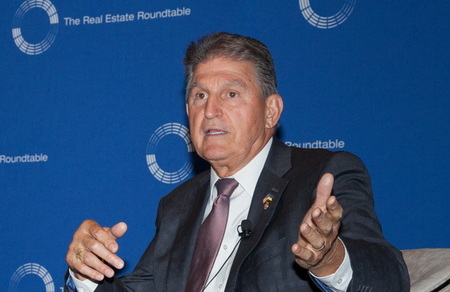
Sen. Joe Manchin (D-WV), a key centrist in Democrats’ ongoing efforts to pass a party-line budget reconciliation bill, said this week he would not move forward on an economic package that contains climate provisions or tax increases, upending weeks of negotiations with Senate Majority Leader Chuck Schumer (D-NY). Manchin,
above, added he would support a limited measure this month aimed at reducing pharmaceutical prices and extending federal subsidies for buying health care coverage. (
The Washington Post, July 14,
Bloomberg, July 15 and
Roundtable Weekly, June 17)
Inflation & Timelines
- Manchin explained his position during a West Virginia MetroNews interview this morning: “I said, Chuck [Schumer], until we see the July inflation figures, until we see the July Federal Reserve rates, interest rates, then let’s wait until that comes out so we know that we were going down the path that won’t be inflammatory to add more to inflation. Inflation is absolutely killing many, many people.” (Full interview and The Hill, July 15)
- The July Consumer Price Index is scheduled for release Aug. 10, after surging to an annual inflation rate of 9.1% in June. (U.S. Bureau of Labor Statistics, July 13)
- Democrats are pushing to pass a bill before the Congressional recess begins on Aug. 8. If any agreement is reached, a bill would have to be drafted, scored, and debated, which could take several weeks as the midterm elections loom. The underlying budget reconciliation instructions authorizing a filibuster-proof bill do not expire until September 30. (The Washington Post, July 15)
- The Roundtable on July 13 commented on the evolving reconciliation talks on its Twitter feed, “As policy negotiations continue, we are working to ensure that any scaled-back bill doesn't include anti-growth, anti-real estate tax hikes such as repeal of like-kind exchanges; increased capital gain tax rates; or revisions to taxation of pass-through entities.”
The only option for Democrats to pass a reconciliation bill this month may be reduced to a limited version focused on prescription drug pricing and a two-year extension of Affordable Care Act funding to prevent major insurance premium hikes. The prescription drug legislation should raise more than sufficient revenue ($288 billion) to pay for a temporary extension of the health care insurance subsidies. (
CNBC, July 15)
# # #
 Sen. Joe Manchin (D-WV), a key centrist in Democrats’ ongoing efforts to pass a party-line budget reconciliation bill, said this week he would not move forward on an economic package that contains climate provisions or tax increases, upending weeks of negotiations with Senate Majority Leader Chuck Schumer (D-NY). Manchin, above, added he would support a limited measure this month aimed at reducing pharmaceutical prices and extending federal subsidies for buying health care coverage. (The Washington Post, July 14, Bloomberg, July 15 and Roundtable Weekly, June 17)
Inflation & Timelines
Sen. Joe Manchin (D-WV), a key centrist in Democrats’ ongoing efforts to pass a party-line budget reconciliation bill, said this week he would not move forward on an economic package that contains climate provisions or tax increases, upending weeks of negotiations with Senate Majority Leader Chuck Schumer (D-NY). Manchin, above, added he would support a limited measure this month aimed at reducing pharmaceutical prices and extending federal subsidies for buying health care coverage. (The Washington Post, July 14, Bloomberg, July 15 and Roundtable Weekly, June 17)
Inflation & Timelines